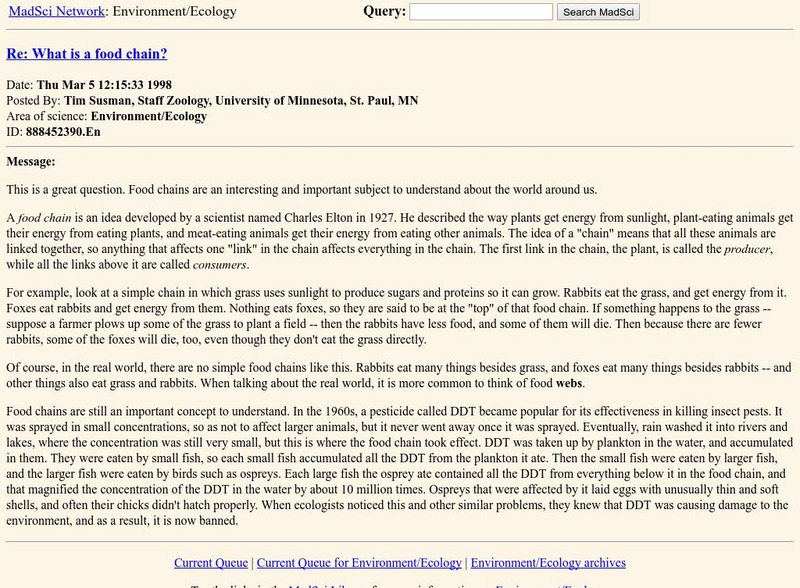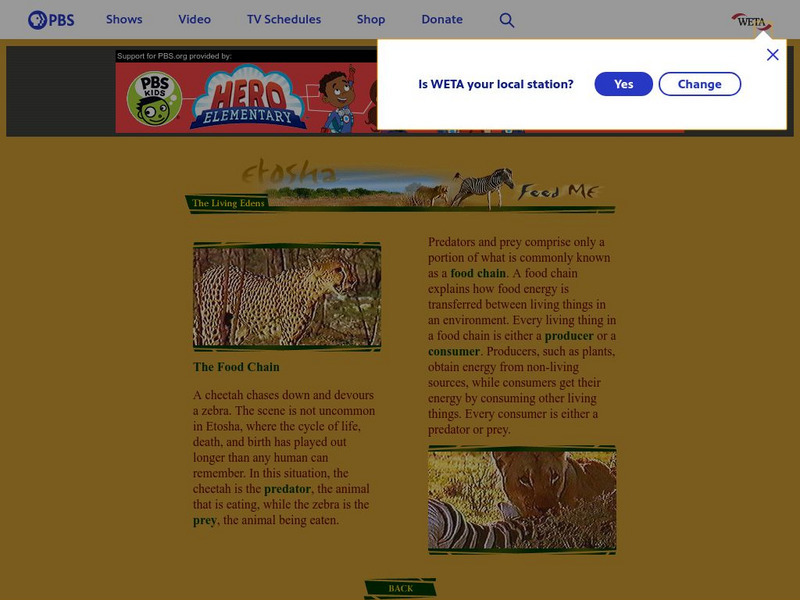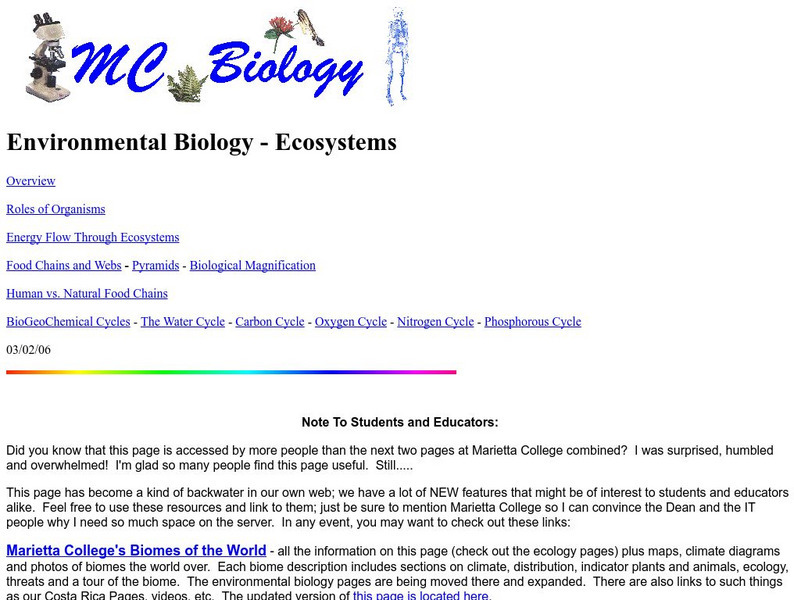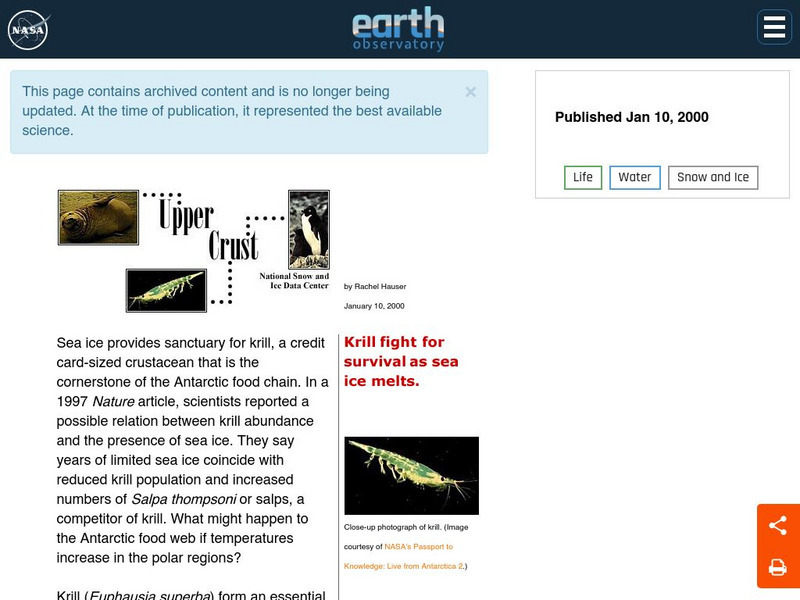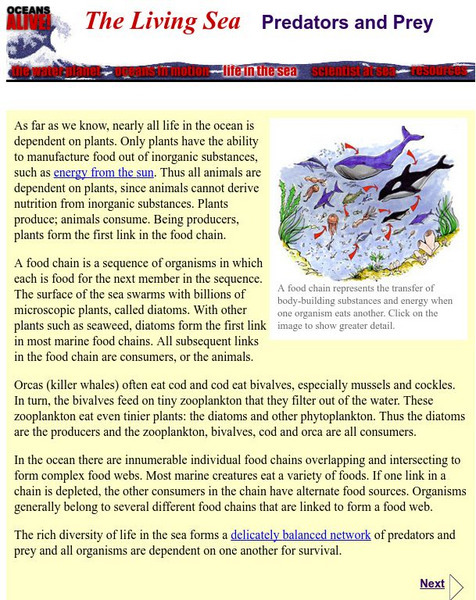It's About Time
Who Eats Whom?
Packed with visual aids and multiple learning opportunities, an engaging exercise challenges individuals as they explore the role of producers, consumers, and decomposers. After discussing differences between food chains, food...
Wildwood Trust
Habitats
The circle of life is all around us, from the black bears in the nearby mountains to the pile of dead leaves in the backyard. Encourage young scientists to take a critical look at the world around them with a set of lessons...
It's About Time
Energy Flow in Ecosystems
Emerging biochemists more fully understand the flow of energy in ecosystems as they explore the laws of thermodynamics and relate them to energy transfer in food chains. They also investigate heat loss from the human body and how...
Kentucky School for the Deaf
Levels of Organization within an Ecosystem
From tiny organisms to entire biomes, young scientists examine the interdependent relationships tying all living and non-living things together with this collection of ecology resources.
Planet Pals
Planet Pals: The Food Chain
Omnivores, herbivores and carnivores are waiting for you. The food chain comes to life at this friendly site.
Science Struck
Science Struck: Difference Between Food Chain and Food Web
Explains the characteristics of food chains and food web; the different levels of producers, consumers, and decomposers; and the differences between food chains and food webs. Includes charts and a Venn diagram comparing the two.
Science Struck
Science Struck: Learn All About the Ocean Food Chain
Read about the different predators, consumers, and producers that make up an ocean food chain.
Bio Topics
Bio Topics: Food Chains and Webs
Trace the energy transfer through food chains and food webs. Check your understanding by hovering your mouse over questions to reveal the answers.
FT Exploring
Ft Exploring: Energy Pyramid and Food Chains
This illustrated guide to food chains and ecological pyramids will help clarify how energy flows through an ecosystem.
Utah Education Network
Uen: Biological Energy Food Chain Practice
After reviewing the roles of consumers, producers and decomposers, you'll create your own food chains using pictures from magazines. The site also has 18 questions to see if you can identify the ecologic role played by various organisms.
Science Struck
Science Struck: A Bird's Eye View of the Desert Food Chain
Describes how a food chain works in a desert and how the Mojave desert food chain works in particular.
Science Struck
Science Struck: Food Chain in the Tundra Region
Describes the characteristics of a tundra biome, how a tundra food chain compares to a tropical food chain, and what the different trophic levels look like.
Science Struck
Science Struck: Examples of Primary Consumers in the Food Chain
Explains what a primary consumer's role in a food chain is and provides examples.
MadSci Network
What Is a Food Chain?
Discussion of what makes up a food chain and its significance. Includes some historical perspectives on developing the concept, and on how a pesticide called DDT affected food chains during the 1960's.
Other
Food Chains and Webs
A very informative site that discusses food chains and webs in detail. Not too complicated and fairly easy to understand, it also includes some pictures.
PBS
Pbs: The Living Edens: The Food Chain
PBS site provides some basic information on the food chain.
Other
Marietta College: Ecosystems
Complete illustrated discussion of energy flow within ecosystems, including discussions of trophic levels, ecological pyramids, food chains and webs, biological magnification, and cycles.
NASA
Nasa Earth Observatory: Upper Crust
Learn how krill fight for survival as the sea ice melts and the population decreases. Discover how krill relate to our food chain and learn about their development.
Other
Bigelow Laboratory for Ocean Sciences: Fitting Algae Into the Food Web
A lesson that helps students understand food chains and food webs. With the background information, interactive activity, and extensions, students will see the interconnectedness and interdependence of organisms. Activity has students...
Science Struck
Science Struck: Examples of Tertiary Consumers
Explains what is meant by a tertiary consumer in a food chain and provides examples.
Museum of Science
Museum of Science: The Living Sea: Predators and Prey
This Museum of Science page does an excellent job of explaining the importance of plants as producers in the sea. The food chain or food web has to start with the plants.
US Geological Survey
Mercury in the Geochemical Cycle
Mercury in the geochemical cycle ultimately affects the food chain. Learn about this and its effect on the Everglades.
Smithsonian Institution
Smithsonian National Zoo: Zoogoer Magazine: Sharks, in Deep
Howard Youth, in his article for Zoogoer Magazine entitled "Sharks, In Deep," examines a range of topics related to sharks including Shark Basics, Troubled Waters, Reaching for Limits, Bites Out of the Food Chain, Discovering Sharks, and...
Other popular searches
- Desert Food Chain
- Animal Food Chain
- Deciduous Forest Food Chains
- Pond Food Chain
- Ocean Food Chain
- Frog Food Chain
- Food Chains in Biomes
- Arctic Food Chain
- Desert Animal Food Chain
- Ocean Animals Food Chain
- Coral Reef Food Chain
- Marine Science Food Chain










